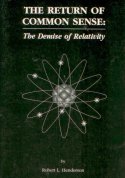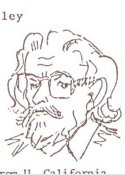von Sergey N. Arteha

On frequency-dependent light speed
Sergey N. Arteha
In: Galilean electrodynamics. 15. 2004, Special issues 1 (Spring), S. 3-8.
S. 3-4: „Criticism of some aspects of SRT“
Die Forschungsgruppe G.O. Mueller referiert in der Ergänzung des Kapitels 4 ihrer Dokumentation diese Arbeit von Sergey N. Arteha:
Den ganzen Beitrag lesen »
von Robert L. Henderson

The Return of Common Sense: The Demise of Relativity
Robert L. Henderson
Common Sense Press, 1992 – Amazon
Description
It is the writer’s contention that the concepts of relativity have been an impediment to the rational progress of science for the last hundred years. Although it has always been assumed that the scientific process was based on sound, verified facts, systematically
Den ganzen Beitrag lesen »
von G.O. Mueller

Aus der Dokumentation von G.O. Mueller Kapitel 2 – Fehlerkatalog – S: Darstellungen / Fehler Nr. 6 (English Version…)
In den Darstellungen der Relativistik wimmelt es von Aussagen „ruhend“ und „bewegt“ ohne Angabe eines Bezugskörpers oder Bezugssystems
Nach dem Relativitätsprinzip der Speziellen Relativitätstheorie kann es grundsätzlich nur relative Bewegung und relative Ruhe geben, weshalb ausnahmslos alle Aussagen über Ruhe und Bewegung, seien sie durch Substantive oder Adjektive ausgedrückt,
Den ganzen Beitrag lesen »
von Don Johnson

On the transverse emission and propagation of light from moving sources
Don Johnson
In: Galilean electrodynamics. 16. 2005, Nr. 1, S. 12-16.
Die Forschungsgruppe G.O. Mueller referiert in der Ergänzung des Kapitels 4 ihrer Doku-mentation diese Arbeit von Don Johnson:
Stellt die Interpretation der Sternlicht-Aberration von Oliver Lodge in seiner 1893 erschienenen Arbeit „Aberration problems. A discussion concerning the motion of the ether
Den ganzen Beitrag lesen »
von Peter Graneau

Reconciliation of Newton with Mach
Peter Graneau
In: Instantaneous action at a distance in modern physics: pro and contra.
Ed.: A. E. Chubykalo, N. V. Pope, R. Smirnov-Rueda. Commack, NY. 1999, S. 75-89.
Die Forschungsgruppe G.O. Mueller referiert in der Ergänzung des Kapitels 4 ihrer Dokumentation diese Arbeit von Peter Graneau:
Den ganzen Beitrag lesen »
von Philipp M. Kanarev

THE NEXT ERROR COMMITTED BY THE NOBEL COMMITTEE
Philipp M. Kanarev
In: The general science journal, November 27, 2011
Announcement.
We shall demonstrate a gist of impropriety of the scientific result, for which the 2011 Nobel Prize in physics has been awarded. In order to expedite an apprehension of the
Den ganzen Beitrag lesen »
von James Paul Wesley

A definition of science and some consequences
James Paul Wesley
In: Physics as a science. Ed.: G. Galeczki (u.a.). Palm Harbor 1998, S. 7-15.
Die Forschungsgruppe G.O. Mueller referiert in der Ergänzung des Kapitels 4 ihrer Dokumentation diese Arbeit von James Paul Wesley:
Den ganzen Beitrag lesen »
von G.O. Mueller

Catalogue of Errors for Both Theories of Relativity
Translation into English:
Chapter 2 – Catalogue of Errors for Both Theories of Relativity
from the documentation of G.O. Mueller
On the Absolute Magnitude of the Special Theory of Relativity
A Documentary Thought Experiment on 95 Years of Criticism
(1908-2003) with Proof of 3789 Critical Works
Text Version 2.1 – June 2004
von Satya Pal Asija

Special Relativity Theory versus Science Reality and Truth (SRT v/s SRT)
(From Aristotle to Einstein Even To Date Same Folly
Rules the Paradigm of Special Relativity)
Satya Pal Asija
Natural Philosoph Alliance, 2009
Abstract:
This paper and concomitant presentation trace the errors in special relativity to Aristotle more than two millennia ago and how with an unintended boost from an
Den ganzen Beitrag lesen »
von Miles Mathis

A revaluation of time (and velocity)
Miles Mathis
In: The general science journal. 2002, http://wbabin.net/mathis/mathis2.htm – 3 S.
Aufgenommen im GOM-Projekt: 2394 weitere kritische Veröffentlichungen zur Ergänzung der Dokumentation Textversion 1.2 – 2004, Kapitel 4.
Auszüge: „As I have shown, time is assumed to be absolute in the sense of being equivalent from one system to another. We must make this assumption in order to calculate velocities, among other things. This does not mean that it is absolute, of
Den ganzen Beitrag lesen »








